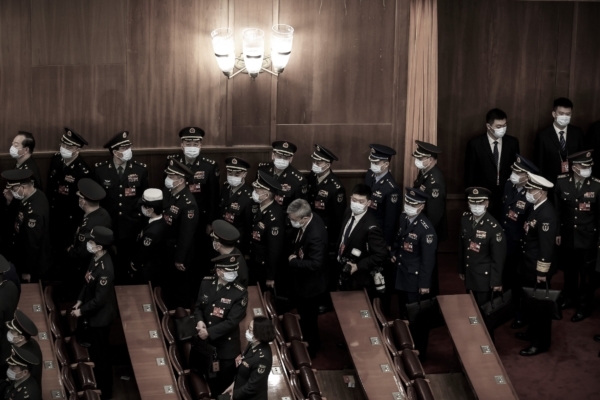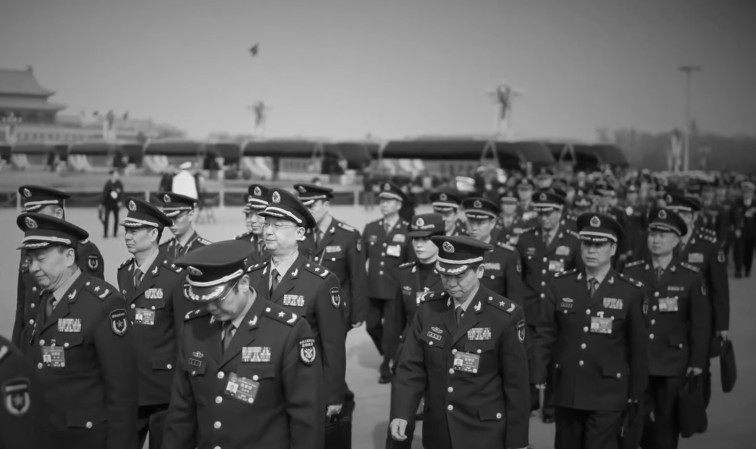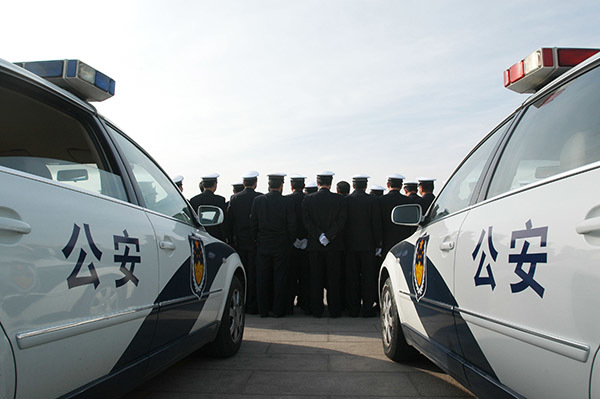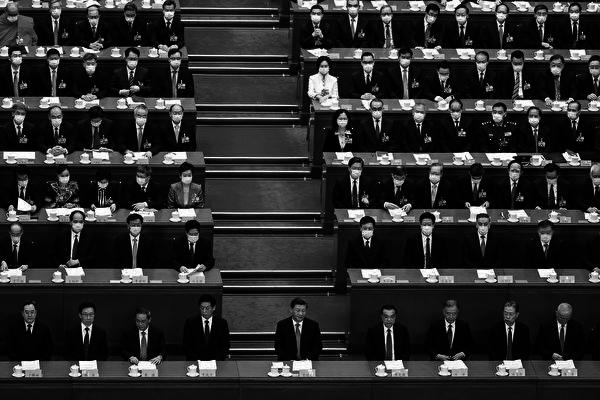Image: A Chinese military canine and demolition unit conducting a security sweep at Tiananmen Square. (Photo by Kevin Frayer/Getty Images)
[People News] Recently, writer, journalist, and political activist Su Xiaokang published an article discussing rumours that Liu Chuang and Xi Jinping are being pressured by senior officials to step down, and that the Xi family army is facing a significant collapse. While the authenticity of whether the Beidaihe meeting can take place is uncertain, the instability of the political situation in Beijing is undeniable, prompting a need to consider the 'post-Xi' era.
Su Xiaokang argues that the nationalisation of the military is the most critical and unavoidable issue as China stands on the brink of major changes. He reflects on the 'Seven Generals Jointly Opposing Martial Law Letter' that emerged on the eve of the June Fourth incident, citing Wu Renhua's book 'Chronicle of Major Events of the June Fourth Tiananmen Incident' as follows:
The seven generals—Ye Fei, Zhang Aiping, Xiao Ke, Yang Dezhi, Chen Zaidao, Li Juqiu, and Song Shilun—publicly sent a letter to the martial law command and the Central Military Commission, urging the military not to suppress the people. The full text reads:
'To the Capital Martial Law Command and forwarded to the Central Military Commission: Given the extremely serious current situation, we, in the name of old soldiers, present the following demands: The people's army belongs to the people and must not oppose the people, nor can it kill the people. It must absolutely not fire on the people and must absolutely not create bloodshed. To prevent further escalation of the situation, the military should refrain from entering the city. (Signed) May 21, 1989.'
However, what is even more crucial is how Deng Xiaoping addressed this 'military admonition.' Wu Renhua records:
The "Letter from the Seven Generals" was printed as a flyer and widely circulated, creating a significant impact. Just one day after they issued their joint letter, the Chinese Communist Party's official newspaper, the "People's Daily," published a response from two senior generals, Nie Rongzhen and Xu Xiangqian, addressing some students from the University of Science and Technology of China. They stated: "The martial law troops are absolutely not targeting students; we hope that students will not believe rumours and will return to school as soon as possible." This use of marshals to mitigate the impact of the Seven Generals' letter is clearly evident.
Among the seven generals opposing martial law, Zhang Aiping, Xiao Ke, Yang Dezhi, and Song Shilun were members of the Central Advisory Commission. On May 26, Chen Yun, the director of the Central Advisory Commission, chaired a meeting of the commission's standing committee, urging veteran comrades to support martial law. Of the 27 standing committee members, five, including Zhang Aiping, Li Yimang, Li Desheng, Huang Hua, and Cheng Zihua, requested leave "due to illness or other matters." The "Chronicle of Major Events of the 1989 Tiananmen Incident" notes that they took leave due to their objections to martial law and the handling of Zhao Ziyang. However, this statement is inaccurate; Cheng Zihua did not oppose martial law.
At that time, the "People's Daily" specifically highlighted in its report on this meeting that the absent Cheng Zihua called the meeting to express his firm support for the correct decisions and measures taken by the Party Central Committee and the State Council to quell the unrest."
Li Peng's "June Fourth Diary" recounts that Xiao Ke and Yang Dezhi provided explanations regarding the petition incident during a meeting. Xiao Ke stated, "I concur with Comrade Chen Yun's remarks and support the leadership collective led by Comrade Deng Xiaoping. I believe that the public security and armed police can maintain order. Therefore, I have reservations about the military coming to Beijing, as I am concerned about the potential for bloodshed. Hence, I signed the joint letter from the seven individuals." Yang Dezhi added, "What is being circulated outside regarding the seven individuals writing a letter is as follows: The situation was extremely tense during those days, and the military faced obstacles. If bloodshed were to occur, it would complicate matters further. Therefore, the seven of us jointly wrote a letter to the martial law troops, requesting them to forward it to the central authorities. This letter was originally intended for the central authorities, but somehow it became public."
According to "The Truth of China's 'June Fourth'" (the English version is titled "Tiananmen Papers"), after receiving these letters from the generals, Deng Xiaoping and Yang Shangkun instructed Yang Baibing, Chi Haotian, and others to visit the generals individually to clarify the situation. Yang Shangkun even made specific phone calls to Xiao Ke, Yang Dezhi, and others. The issue regarding the generals' petition was swiftly resolved.
Su Xiaokang provided an overview of the entire incident:
1. The use of marshals to pressure generals was essentially a form of deception: "The martial law troops are absolutely not targeting the students," which indicates that under the structure of "the party commands the gun," the two marshals were merely puppets;
2. The explanations given by Xiao Ke and Yang Dezhi after the fact did not alter their original intentions.
3. The generals clearly did not dare to oppose the central authorities directly.
Nevertheless, the significance of the "seven generals" incident is:
1. The suppression of the common people by the People's Liberation Army (PLA) is unacceptable; this 'heavenly principle' is deeply ingrained in the minds of senior PLA generals, presenting a significant obstacle for the Chinese Communist Party (CCP) as it attempts to 'take drastic measures' once again.
2. The military has previously 'disobeyed orders,' as seen with the 38th Army, but the principle of 'the Party commands the gun' ultimately leads to the PLA being labelled as 'perpetrators of massacre.' The only viable solution is the 'militarisation of the army,' meaning that the military should not be under the command of any political party.
3. Achieving militarisation cannot depend on the conscience of senior generals; it must follow a constitutional path, ensuring that this principle is enshrined in the constitution for proper guarantees.
Today's predicament. Su Xiaokang once interviewed former CCP Navy Lieutenant Colonel Yao Cheng, who stated:
Since Xi Jinping assumed power, significant reforms have been made to the military's structure, which have revealed some underlying issues. In terms of structural adjustments, the seven military regions have been consolidated into five combat zones, a term that implies a state of war.
If these are indeed combat zones, there should be two main parties involved; the military represents one side, but who is the other? It can be argued that mainland China is currently in a state of peace, which suggests that the unarmed common people are the targets of the PLA's operations.
Su Xiaokang points out that the fact that stability maintenance costs exceed military expenditures indicates that the CCP prioritises suppressing domestic opposition over national defence.
He believes that, in reality, the combat zones serve merely as frontline command posts for the Central Military Commission; aside from operational command authority, all other powers are diminished. This reflects the true intention behind Xi's decision to abolish military regions and establish combat zones.
In reality, Xi Jinping has dismantled the old structure of the People's Liberation Army (PLA) through the reforms of 'military region to war zone' and 'toasting to relinquish military power', effectively neutralising threats to his authority. However, has he truly succeeded in gaining control over the military? As significant changes unfold, will this army heed his commands?











News magazine bootstrap themes!
I like this themes, fast loading and look profesional
Thank you Carlos!
You're welcome!
Please support me with give positive rating!
Yes Sure!